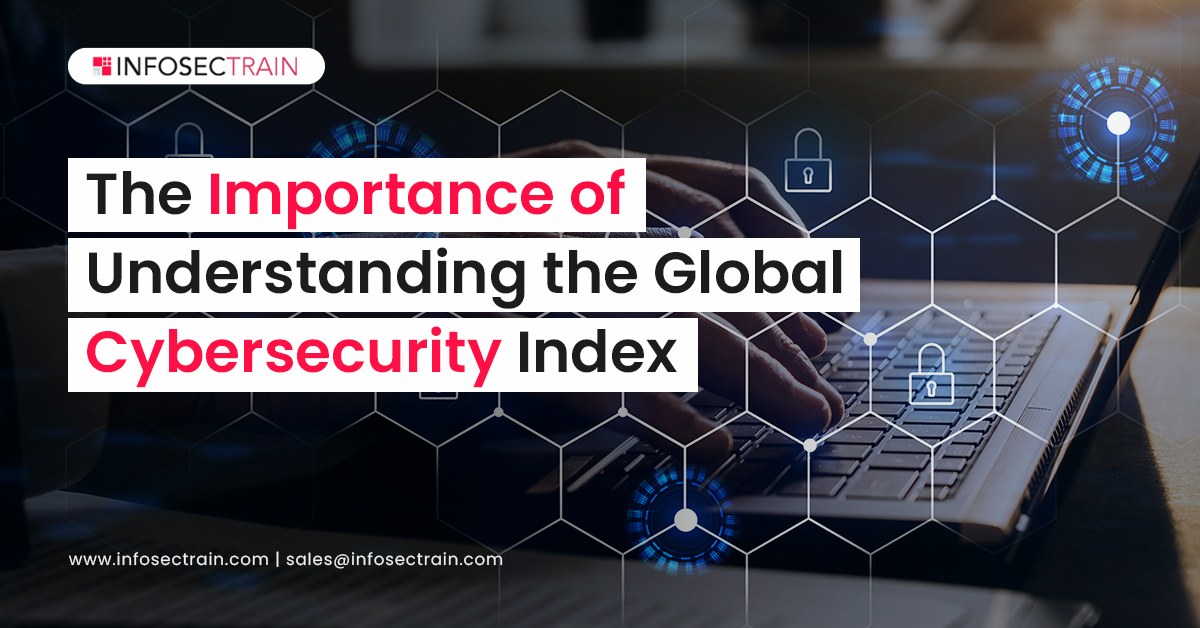The Importance of Understanding the Global Cybersecurity Index
With the advent of modern technologies such as IoT, artificial intelligence, and cloud computing, there is a rapid increase in the number of interconnected devices globally. It has also increased the number of cyber-attacks and data breaches. As a result, cybercrime is a global concern, and appropriate solutions are essential if proper responses are to be found. The Global Cybersecurity Index (GCI) is one such instrument to control cybercrime and provide feedback.

What is the Global Cybersecurity Index (GCI)?
The Global Cybersecurity Index (GCI) is a reliable resource that assesses countries’ global cybersecurity commitment to increase awareness of the issue’s relevance and various elements. In simple terms, GCI is a valuable tool for determining how much emphasis a country places on the concept of cybersecurity within its borders. It is computed by the International Telecommunication Union (ITU), a United Nations specialized agency.
Why is the Global Cybersecurity Index (GCI) important?
The International Telecommunication Union (ITU) first launched the Global Cybersecurity Index in 2015 to measure the commitment of 193 ITU Member States and the State of Palestine to cybersecurity in order to help them recognize areas for improvement and encourage countries to take action by raising awareness about the state of cybersecurity globally. As cybersecurity risks, objectives, and resources change, the GCI has evolved to provide a more realistic picture of countries’ cybersecurity efforts. GCI’s fundamental concept is that, while we live in the age of the industrial revolution, everything around us is becoming digital. Are we paying enough attention to securing those digitized assets? Its goal is to better understand countries’ cybersecurity commitments, highlight gaps, encourage the adoption of best practices, and give valuable insights for countries looking to strengthen their cybersecurity postures.
Artificial intelligence, big data, cloud computing, internet 2.0, and internet 3.0 are just a few examples of technologies that have become intertwined in our daily lives, but are we paying enough attention to securing those assets or securing cyberspace? The GCI is based on this basic notion. It seeks to draw global attention to the idea that we must pay close attention to how we manage our cyberspace just as we value our financial assets.
Pillars of Global Cybersecurity Index (GCI):
As cybersecurity has such a broad range of applications, spanning many businesses and sectors, each country’s level of development or participation is rated along five pillars before being summed together to produce an overall score. There are five parameters of GCI:
- Legal measures: In this, cybercrime and cybersecurity laws and regulations are being assessed.
- Technical measures: Using national and sector-specific authorities to assess the deployment of technical capabilities.
- Organizational measures: Measures the effectiveness of national cybersecurity plans and organizations.
- Capacity-building measures: Measures the cybersecurity capacity development and awareness campaigns, training, education, and incentives.
- Cooperation measures: Partnerships between agencies, businesses, and countries are being measured.
What is the Global Cybersecurity Agenda (GCA)?
The GCI is based on a multistakeholder approach and initiative. It uses the capacity and expertise of several organizations to improve the survey’s quality, boost international cooperation, and promote knowledge sharing on this topic. The Global Cybersecurity Agenda (GCA) of the ITU serves as the initiative’s broad foundation and framework.
Why is it essential to comprehend cybersecurity across nations?
Simply described, cybersecurity is the process of preventing digital attacks on networks, systems, hardware, data, or any other digital infrastructure. Cybersecurity is critical to nations, businesses, and even individuals because it safeguards all types of data against theft and loss. Sensitive data, Personally Identifiable Information (PII), Protected Health Information (PHI), personal information, intellectual property, data, and governmental and industry information systems all fall under this category.
Which country came out on top in the Global Cybersecurity Index for 2020?
The International Telecommunication Union’s (ITU) latest GCI reveals an increase in global commitment to combat and reduce cybersecurity risks. Despite the problems of COVID-19 and the increasing migration of everyday activities and socio-economic services into the digital world, countries are attempting to strengthen their cyber security, according to the newly issued 2020 Global Cybersecurity Index.
The table below shows the GCI rank of the top 10 countries in 2020:
| Name of the Country | Rank |
| United States of America | 1 |
| United Kingdom | 2 |
| Saudi Arabia | 2 |
| Estonia | 3 |
| Korea | 4 |
| Singapore | 4 |
| Spain | 4 |
| Russian Federation | 5 |
| United Arab Emirates | 5 |
| Malaysia | 5 |
| Lithuania | 6 |
| Japan | 7 |
| Canada | 8 |
| France | 9 |
| India | 10 |
Final Words
Cybersecurity is always evolving. Whether it’s a global health concern, climate change, aging populations, or another future concern, digital technologies are a compelling instrument for moving the world forward. Digitalization affects all countries to some level, and cybersecurity should be a top concern as a vital facilitator of the economy, society, and government that relies on digital networks. Countries must address their cybersecurity strengths and weaknesses, as well as utilize their competitive advantages, in order to boost overall cyber capacity and health. The Global Cybersecurity Index (GCI) can assist countries in getting started on this path.






 1800-843-7890 (India)
1800-843-7890 (India)